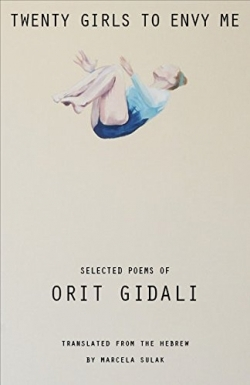Twenty Girls to Envy Me
Orit Gidali’s poetry reflects segments of the contemporary Israeli psyche: awareness of fragility; a ferocious love for a complex inheritance; and a desire for the cessation of violence, as much for one side as for the other. Translated from Hebrew—a language that only lives in the mainstream because of Israeli pioneers, and which centers these poems all the more in a particular time and place—these lines weave themes of motherhood together with fears of impermanence, borrowing and reworking biblical tropes, even as they look cautiously toward an uncertain future:
Now just get out…
Or even better, don’t go out and we will upholster the walls with more books. Not to save us, but to augment our weight, to sink together, comforted in the depths.
Puns await those with a firm grasp of both languages, as the Hebrew originals are maintained alongside their translated counterparts. Whether Gidali is wrapping her words tenderly around her children, pushing aside worries about their futures with the IDF, or contemplating the evolution of love by aligning it to that for a biblical king, she arrives at meaning, or strives toward it, poignantly.
Reviewed by
Michelle Anne Schingler
Disclosure: This article is not an endorsement, but a review. The publisher of this book provided free copies of the book and paid a small fee to have their book reviewed by a professional reviewer. Foreword Reviews and Clarion Reviews make no guarantee that the publisher will receive a positive review. Foreword Magazine, Inc. is disclosing this in accordance with the Federal Trade Commission’s 16 CFR, Part 255.

